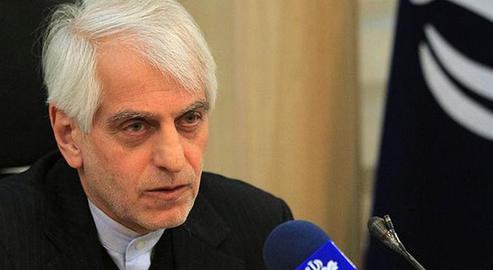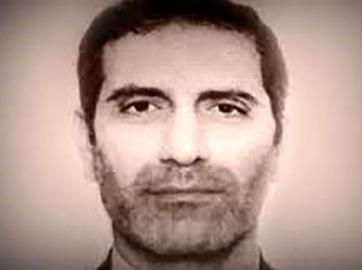Last year Germany arrested an Iranian diplomat who was suspected of planning a terrorist attack on European soil. This year, on January 8, the European Union (EU) announced new sanctions on Iranian entities in connection to the alleged plot. And now, in unprecedented remarks, Ali Majedi, Iran’s former ambassador to Germany, has said that European accusations against Iranian security forces must be taken “seriously.”
Majedi, Iranian ambassador to Germany from June 2014 until he retired last November, told [Persian link] the Iranian Students’ News Agency that “European countries have tabled evidence that cannot easily be dismissed, although they cannot easily prove it either.” He added that allegations of terrorism and assassination plots, which have been made on several occasions, have eroded trust that was building between the Islamic Republic and Europe. And it is the first time since the nuclear treaty was signed that the EU has imposed fresh sanctions on Iran.
Specific EU sanctions were levelled against an Iranian Intelligence Ministry unit and two individuals in connection with the alleged assassination plots. The EU accused the individuals of attempting or executing attacks in several European countries – Denmark, France and the Netherlands. Iranian diplomat Asadollah Asadi was arrested in Germany and the Dutch government expelled two Iranian diplomats on suspicion of being involved in the assassination of two Iranians on Dutch soil. Denmark and France also accused Iran of plotting assassinations and bombings in their own countries.
European accusations of such plots against Iran began in spring 2018 – but Iranian officials have always dismissed the plains. As tensions grew last year, former Iranian Foreign Minister Kamal Kharrazi, who is close to Supreme Leader Ali Khamenei, visited Paris and said that “rogue elements” might have been responsible for such actions. But European governments have clearly lost patience with these protestations of innocence.
“Personal Opinion”
The Iranian Foreign Ministry has also tried to distance itself from Majedi’s statements – saying that as a retiree his remarks were just "personal opinions.” The ministry said [Persian link] that “The evidence presented by European countries to support their claims are not provable and cannot be relied on. ... Probably hostile [anti-Islamic Republic] groups outside Iran carry out these operations in a way that implicates the Islamic Republic.” The statement also blamed western media for bias against the Islamic Republic in presenting the allegations.
But Majedi said that if rogue elements or hostile groups are carrying out sabotage operations under the name of the Islamic Republic, “we must be able to prove it so that they would trust us [when we say] that although these actions are taking place under the name of Iran, they are not directed by Iran.”
Majedi has a personal stake in the debate. Asadi, the diplomat arrested in Germany in early July of last year, was a senior Iranian diplomat in Austria and was arrested while Majedi was ambassador to Germany. Majedi said he was unable to dismiss the evidence against Asadi presented by the Europeans. The arrest even coincided with an official visit by Iran’s President Hassan Rouhani to Austria – and while the arrest of an Iranian representative in the host country could have led to Rouhani cancelling his trip he disregarded the situation and flew to Vienna as planned.
Who Is a “Rogue” Element?
In the jargon of the Islamic Republic, “rogue” refers to a government agent who, without any orders from his superiors and using only his own judgement, takes actions that he believes are consistent with the wishes of the Supreme Leader. Khamenei cannot express all of his wishes publicly, the reasoning goes, because of his position. The term became popular under the presidency of Mohammad Khatami when it was revealed that a group of senior Intelligence Ministry officials were responsible for the “chain murders” of dissident artists, writers and intellectuals. The Ministry issued a statement at that time, labelling those responsible as “rogue” elements; they had acted in the name of the government, but their actions were neither planned nor approved by the Islamic Republic.
The term has been increasingly used whenever events have embarrassed the Islamic Republic’s authorities, from attacks on student rallies to disrupting speeches by figures such the deputy speaker of the parliament, and even attacks on foreign embassies and diplomatic missions in Tehran.
In 2011 “rogue” protesters attacked the British embassy in Tehran, causing extensive damage to the buildings. The UN Security Council condemned the attack. Iranian officials later claimed that the protesters vacated the embassy after receiving a message from the Supreme Leader – who gently criticized the attackers while praising their “feelings” at the same time. The United Kingdom and Iran had no diplomatic relations for four years after the attack.
In 2016, following the execution of Shia cleric Sheikh Nimr al-Nimr in Saudi Arabia, another group attacked the Saudi embassy in Tehran and set it on fire. The Saudi consulate in Mashhad was also attacked. The government said “rogue” elements were responsible for the attacks including some clerics and members of the Basij paramilitaries which are affiliated with the Revolutionary Guards.
Kind Words for “Rogues”
The accused clerics were tried by the Special Clergy Court and the other accused were tried by a civilian court. Saudi Arabia broke diplomatic relations with Iran and the UN Security Council strongly condemned the attack. But after several years, the courts have yet to issue verdicts for or against the attackers. Ayatollah Khamenei condemned the attack as “damaging to Islam and Iran” but then followed it with kind words [Persian link] about the attackers, saying that the “these revolutionary and Hezbollahi young people have more sense and understanding about many issues than some elders.” He added that attacking Saudi and British embassies “must not be used as excuses to lash out at them”.
Early after the Islamic Republic was established, its government was accused of conducting assassinations outside Iran. The Islamic Republic even implicitly accepted responsibility for the 1991 assassination of Shapour Bakhtiar, the deposed Shah’s last prime minister, but after the assassination of four Kurdish opposition leaders at the Mykonos Greek restaurant in Berlin in 1992, it seemed that operations by “rogue” elements had been limited to inside Iran.
After the 2017 reelection of President Rouhani, Khamenei asked his own supporters to confront issues, including cultural ones, by acting according to a “fire at will” directive [Persian link] that seemingly encourages some individuals to take actions based on their own judgment. But these actions have led to unforeseen costs – such as the current diplomatic difficulties with European countries. The support of the Supreme Leader and institutions under his command for such individuals makes it difficult, if not impossible, to believe the Iranian authorities when they do not take responsibility for terrorism and assassination plots and blame them instead on “rogue” elements.
Related Coverage:
Decoding Iran’s Politics: The Intelligence Ministry’s Alleged Operations in the EU, January 18, 2019
Decoding Iran's Politics: The Chain Murders of Dissidents, November 30, 2018
Decoding Iran’s Politics: Iranian Embassies and Terrorism Allegations, October 20, 2018
Iranian-Belgian Couple Charged with Bomb Plot in Paris, July 2, 2018
How Iran’s Media Covered the Saudi Embassy Attacks, January 4, 2016
The Story behind the State-Sponsored "Spontaneous" Torching of the Saudi Embassy, January 3, 2016
Cover-ups, Clashes, and Iran-Argentina Relations: The Mysterious Death of Alberto Nisman, January 24, 2015
Exile, Assassinations, Negotiations: 10 Tales of Iran and Europe, November 6, 2014
visit the accountability section
In this section of Iran Wire, you can contact the officials and launch your campaign for various problems


























comments